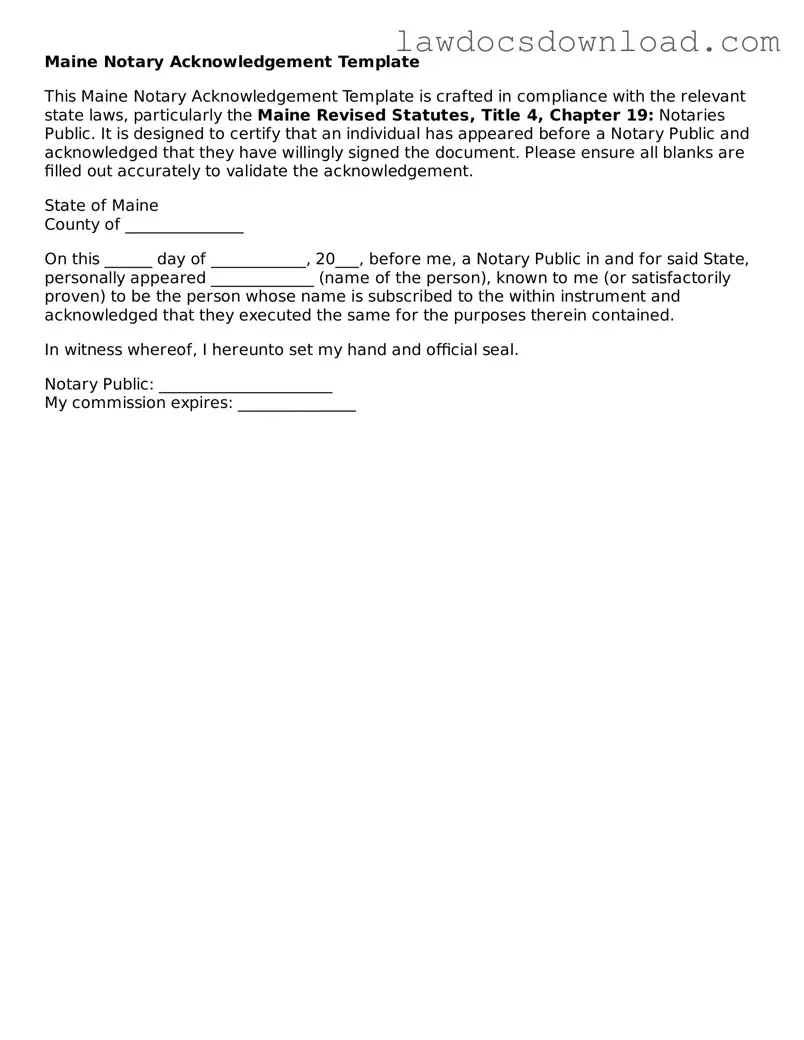The Maine Notary Acknowledgement form shares similarities with the Jurat form, which is also used in notarial acts. Both documents provide a structured way for signatories to declare their signatures under oath. However, while the Notary Acknowledgement confirms the identity of the signatory and that they signed the document willingly, the Jurat additionally requires the signer to swear or affirm that the contents of the document are true.
Comparable to the Maine Notary Acknowledgement form is the Affidavit. An affidavit is a written statement made under oath, often used in court proceedings or other legal processes. It parallels the Notary Acknowledgement in its requirement for a sworn declaration before a notary. Both forms serve to legally affirm the authenticity of the statements or signatures made by an individual.
Another document analogous to the Maine Notary Acknowledgement form is the Power of Attorney (POA). While the POA itself delegates authority from one person to another, the involvement of a notary acknowledgement is crucial for its validation, similar to how a notary confirms the signer's identity and voluntary action in the Notary Acknowledgement form. This ensures that the document is legally binding and the signatory's intentions are clear.
The Deed of Trust is a document often used in real estate transactions to secure a loan with the property being purchased. It resembles the Maine Notary Acknowledgement form in that it typically requires a notarial act to verify the signatory's identity and voluntary signature. This formality helps protect all parties involved by providing a legal confirmation of the document's execution.
Loan Agreements also share characteristics with the Maine Notary Acknowledgement form. These agreements, essential for documenting the terms of a loan, often necessitate a notary's signature to validate the identities of the parties involved and their agreement to the terms. This process parallels the acknowledgement's role in confirming a document's voluntary execution.
The Release of Liability form, used to waive one's rights to legal claims in certain situations, requires notarization to ensure its enforceability, akin to the Maine Notary Acknowledgement. In both instances, the notary public verifies the signatory's identity and intention, adding a layer of legal validity to the document.
Marriage Licenses, while distinct in function, often require notarization in some jurisdictions. This requirement underscores the similarity to the Maine Notary Acknowledgement form in ensuring that signatures are willingly given and the parties fully comprehend their commitment, reinforcing the legal standing of the document.
The Consent Form, used in various contexts to agree to certain terms or actions, often requires a notary's acknowledgement when legal verification of the signer's understanding and agreement is necessary. This mirrors the Maine Notary Acknowledgement's function of validating the signatory's intentional and voluntary action.
Last, the Declaration of Domicile, a document establishing a person's primary residence, is similar to the Maine Notary Acknowledgement form in its need for notarization. This ensures the declaration is made willingly and with a clear understanding of its implications, providing legal confirmation of residency status.

